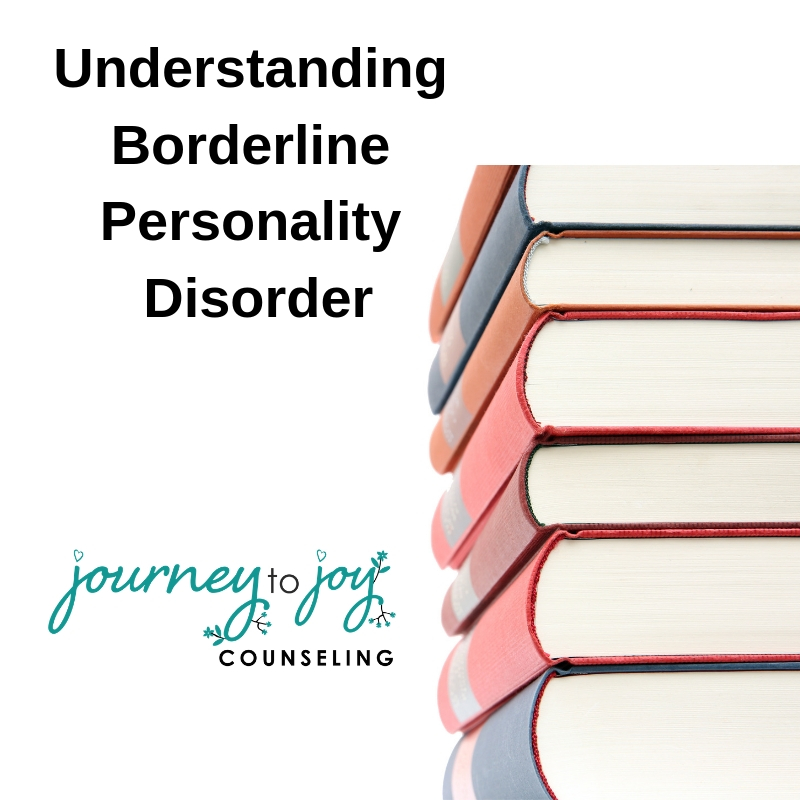
Borderline Personality Disorder (BPD) is a mental health diagnosis that is gaining a lot of recognition lately. While the diagnosis gets thrown around a lot, I think it’s important to talk about what BPD is—and what it isn’t. If you love, care about, or work with someone with BPD, this blog is for you!
What is Borderline Personality Disorder?
BPD is often identified by either the tagline “I hate you don’t leave me” or “Walking on eggshells”. Those with BPD are often triggered by perceived abandonment—and will react in an impulsive, angry, or self-harming manner. Around 2% of the population have a BPD diagnosis, according to the National Alliance on Mental Illness (NAMI) with around 75% of those being women.
Those with BPD struggle to regulate their emotions. When they get upset, they are unable to self-soothe or calm themselves down. Those with BPD often are impulsive, struggle with healthy boundaries, and have rocky relationships. It’s very common for them to display self-harming behaviors, including cutting and suicide attempts. They have low self-image and tend to view things in extremes. They will also manipulate others when they feel threatened.
Those with BPD also have a fluctuating sense of identity. They may reinvent themselves over and over again. This means they may drastically change their looks, their careers, or even their interests. It’s common for those with BPD to quickly shift activities of leisure. They may fixate on a new hobby for a while, only to quickly move onto something else. This can also be said for their relationships. They may view you one day as their friend, and then quickly view you as an enemy.
Symptoms of Borderline Personality Disorder
According to the DSM-5, the treatment manual for those in the mental health field, BPD is a Personality Disorder. Personality Disorders are ingrained patterns of behavior that go against culturally accepted behaviors. Personality Disorders create life-long problems in relationships and overall functioning.
At least 5 of the following criteria must be present to warrant a BPD diagnosis:
- Frantic efforts to avoid real or imagined abandonment.
- A pattern of unstable and intense interpersonal relationship characterized by alternating between extremes of idealization and devaluation.
- Identity disturbance: markedly and persistently unstable self-image or sense of self.
- Impulsivity in at least two areas that are potentially self-damaging (e.g., spending, sex, substance abuse, reckless driving, binge eating).
- Recurrent suicidal behavior, gestures, or threats, or self-mutilating behavior
- Affective instability due to a marked reactivity of mood (e.g. intense episodic dysphoria, irritability, or anxiety usually lasting a few hours and only rarely more than a few days).
- Chronic feelings of emptiness
- Inappropriate, intense anger or difficulty controlling anger (e.g. frequent displays of temper, constant anger, recurrent physical fights).
- Transient, stress-related paranoid ideation or severe dissociative symptoms.
It’s common for those with BPD to have co-occurring diagnoses. Those with BPD have a higher instance of eating disorders, ADHD, Depression, Anxiety, Bipolar disorder, and addictions.
Those with BPD often have a history of trauma, but that may not always be the case. It’s common for those with BPD to have a history of physical or sexual abuse, and/or a history of childhood abandonment. According to NAMI, there is also a strong genetic link with BPD. BPD is 5 times more common when you have a relative that also has the diagnosis. While research is still not clear, it also does appear that the brain function responsible for controlling emotions and decision making may not function properly.
Treatment of Borderline Personality Disorder
Dialectical Behavioral Therapy (DBT) has been shown to be extremely helpful to those with BPD. DBT helps to teach those with BPD mindfulness techniques, as well as radical acceptance. This can help decrease impulsive behavior, control mood swings, and improve their relationships with others.
Cognitive Behavioral Therapy (CBT) is also another type of therapy that can help those with BDP. CBT can help those with BPD challenge their core belief systems, reduce impulsive behaviors, and help them also regulate their mood.
Medications may help with some of the symptoms, but they will not “cure” the Personality disorder. Medications can be prescribed to help with the impulsivity and any underlying depression or anxiety that may be present.
Support for Family Members and Friends
It can be very, very difficult to have a relationship with someone with BPD. In fact, if you love and care about someone with BPD, it may be helpful to consider therapy. A therapist can help you determine healthy boundaries, and how to protect yourself in the relationship with the other person. When you set boundaries, they may perceive it as a form of rejection or abandonment. It’s important for you to know how to handle this when and if it occurs.
Those who love someone with BPD can very easily fall into codependency. There is very much a pattern of rescuing the person with BPD from hurt, abandonment, and rejection. Remember, the person with BPD may live in extremes, so even little things to them become a crisis. It’s important that you see this dynamic and work with a therapist on how to be healthier.
Resources for Borderline Personality Disorder
Here are some of my favorite books for those who have BPD or those that care for someone with BPD:
“I Hate You Don’t Leave Me: Understanding the Borderline Personality” by Hal Straus and Jerold Jay Kreisman
“Stop Walking on Eggshells: Taking Your Life Back When Someone You Care about Has Borderline Personality Disorder” by Paul Mason, MS and Randi Kreger (The workbook is also available, which I highly recommend)
“Understanding the Borderline Mother: Helping Her Children Transcend the Intense, Unpredictable, and Volatile Relationship” by Christine Ann Lawson
“Surviving a Borderline Parent: How to Heal Your Childhood Wounds and Build Trust, Boundaries, and Self-Esteem” By Kimberlee Roth and Freda B. Friedman
*Christy Fogg, MSW, LCSW is a licensed therapist at Journey to Joy Counseling. Christy enjoys doing marriage/couples counseling, individual counseling, premarital counseling. She also provides family counseling, teen and adolescent counseling.
Journey to Joy Counseling serves the Indianapolis area, including Carmel, Fishers, Noblesville, Zionsville, and Westfield.



